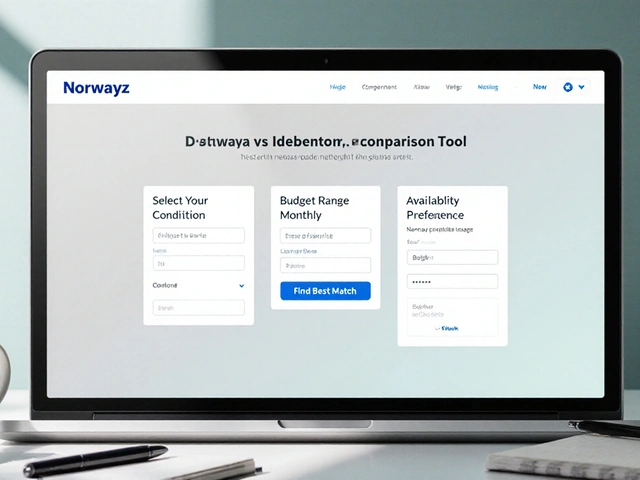Hot flushes after a single glass of wine? Can't sleep, or finding those old trousers just a bit tighter? A lot of us joke about 'the change', but menopause really does mix things up in unexpected ways. Changing hormones can spark cravings, bloating, brain fog, or even leave you wide awake at 3 a.m. Who knew that what you choose for lunch could affect your mood, bones, and even those famous night sweats?
How Menopause Changes What Your Body Needs
Hormones take you on quite a ride during menopause, and your body's nutritional demands shift, often without warning. It starts with oestrogen dropping, messing with metabolism, muscle mass, bone strength, heart health, and even your skin. You might notice fat shifting from your hips to your tummy, or you suddenly become lactose intolerant after decades of drinking tea with milk. Oestrogen isn't just a reproductive hormone—it's a defender of your bones, heart, and brain, so when it dips, your risk for osteoporosis and heart disease quietly creeps up.
Diets packed with processed foods, sugar, caffeine, and alcohol don't do many favours during this transition. They make mood swings, insomnia, and flushes more intense. On the flip side, eating more veggies, healthy fats, and plant proteins can actually help your body handle the chaos. Calcium and vitamin D suddenly matter more than you ever thought possible, though it's not just about drinking milk—your gut might absorb less with age, so you need extra attention to what lands on your plate. Many women develop insulin resistance, too—meaning carbs that used to be fine suddenly cause big blood sugar spikes. Ever wonder why you feel hungry more often or why your love handles seem to grow overnight? Blame shifting insulin and falling oestrogen.
British research in 2024 showed women eating a Mediterranean-style diet—lots of olive oil, beans, greens, and oily fish—were far less likely to report severe flushes compared to those eating a typical Western diet. They also had steadier moods and fewer cravings. That’s not magic, it’s just science: phytoestrogens—plant compounds found in things like flaxseed, soya, and chickpeas—can slightly mimic oestrogen in your body, blunting the ups and downs. But it's not just about what to eat—when and how you eat also matters. Some women swear by spreading protein evenly throughout the day rather than loading up at dinner.
Here's something most doctors skip: gut health. Oestrogen affects your gut bacteria, so probiotics and fibre-rich foods suddenly matter for more than just digestion. A review in The Lancet in late 2023 found that women with healthier gut bacteria—usually those eating lots of leafy greens, yoghurt, and nuts—reported fewer symptoms and fewer infections during menopause.
Top Foods to Eat During Menopause
Your shopping trolley really can become your best friend. Choose foods brimming with nutrients, fibre, plant oestrogens, and healthy fats to help your body soften the impact of menopause. Here’s what you’ll want to stack your cupboards with:
- Phytoestrogen-rich foods: These are your secret weapon. Try soya products (like tofu, soya milk, and edamame), flaxseeds, chickpeas, and lentils. Just two servings a day might make a noticeable difference for flushes, according to a 2024 University of Surrey study.
- Calcium and vitamin D foods: Your bones are now at higher risk of thinning, so add low-fat dairy, fortified plant milks, sardines with bones, pak choi, and broccoli. Don't forget daily sunlight or a supplement for vitamin D, since you need around 10 micrograms a day after age 50.
- Oily fish: Salmon, sardines, and mackerel supply omega-3 fats for your heart, brain, and joints. Aim for two servings a week. If you're veggie, sprinkle walnuts, chia, and flaxseed on your porridge.
- Whole grains: Brown rice, quinoa, oats, and wholemeal bread keep you fuller longer and steady your blood sugar, which helps curb cravings and keeps your energy up.
- Fibre-rich fruits and vegetables: As metabolism slows, constipation becomes an issue, so up your intake of berries, apples, carrots, and leafy greens. Aim for at least five portions a day, focusing on variety.
- Probiotic foods: Yoghurt with live cultures, kefir, unpasteurised sauerkraut, and miso all support your gut health. Good bacteria help balance your immune system and may even help mood swings.
Snacking smart really matters. Swap your daily biscuit or cheese for a handful of unsalted nuts, a couple of squares of dark chocolate, or oatcakes with hummus. These choices steady your blood sugar and power you through those randomly-timed energy drops.
| Nutrient | Amount | Example Foods |
|---|---|---|
| Calcium | 1200 mg | Milk, yoghurt, sardines, broccoli |
| Vitamin D | 10 mcg (400 IU) | Sunlight, salmon, fortified cereals |
| Fibre | 30 g | Oats, legumes, berries |
| Omega-3 fatty acids | 1.1 g | Salmon, walnuts, flaxseed |
Don't forget hydration—hormonal shifts can make you prone to dehydration, which means every cup of water does double duty for skin, flushes, and mood. Herbal teas without caffeine count, but fizzy diet drinks don’t. Little upgrades like these add up much faster than you’d think.

Foods to Avoid or Limit During Menopause
Some foods can make symptoms worse. Avoiding them can really take the edge off those relentless hot flushes, sleepless nights, and achy joints.
- Alcohol: It’s a harsh reality, but alcohol—especially red wine—can cause hot flushes and lower your sleep quality. Even one glass may set off night sweats, and it increases your long-term risk of breast cancer, which rises after menopause. If you can’t skip it entirely, limit to one small glass, and plan for alcohol-free days.
- Caffeine: Coffee, energy drinks, and even strong black tea might stir up flushes, insomnia, and anxiety. Switch to herbal teas or decaf most days. Chamomile and peppermint are gentle alternatives that won’t rev your system.
- Sugar: With less oestrogen, your body loses its knack for processing sugar, so it swings from highs to lows. Sweets, pastries, sugary yoghurts, and soft drinks leave you irritable and tired. Stick with fruit, unsweetened yoghurt, or dark chocolate.
- Processed foods and salty snacks: Frozen pizzas, crisps, and fast food pack in salt, preservatives, and unhealthy fats. Your blood pressure creeps up faster after menopause, so fresh-cooked meals are always better.
- Saturated fats: Heavy amounts of cheese, cream, and fatty meats make it easier to gain central body fat and clog up arteries. Roast your veg with olive oil instead, and try swapping bacon for grilled tofu on your breakfast toast.
A 2024 NHS survey found women consuming more than two servings of processed foods daily were twice as likely to report severe menopausal symptoms compared to those sticking to home-prepared or fresh foods. Trans fats—found in many baked goods—worsen inflammation and have been linked to joint pain and mood dips during menopause.
Spicy curries and wasabi can also trigger flushes for some, though not everyone is sensitive. If you track your food and symptoms for a week, you’ll start to see patterns that help you adjust your own diet. It’s not about deprivation—just spotting what your body likes and what it’s had enough of.
| Food Type | Possible Effect |
|---|---|
| Red wine | Flushes, sleep problems |
| Fizzy drinks | Bloating, sugar spikes |
| White bread | Blood sugar swings |
| Crisps, processed snacks | Salt, inflammation |
| Coffee (over 2 cups) | Anxiety, sleeplessness |
One overlooked trick: balance each meal with something from each food group—protein, carb, healthy fat, and vegetables. This slows sugar absorption, keeping you fuller and steadier throughout the day. Meal prepping or batch-cooking on Sundays helps you dodge cravings at 4 p.m. or resist late-night snacking.
Making Changes That Actually Stick
It’s pointless making a whole new diet if you can’t keep to it for more than a week. The best approach is small, steady tweaks. Start by swapping one food at a time: maybe trade white toast for seeded wholegrain, or swap your usual cheese sandwich for a roasted veggie wrap with houmous. If a food triggers symptoms, don’t torture yourself by cutting it forever—just cut back or keep it as an occasional treat.
Batch cooking helps—prepare chickpea stew or lentil dhal so your freezer has ready-made, menopause-friendly meals. Frozen veggies are just as nutritious as fresh, and handy for throwing into stir fries when you’re tired after work. If you're feeling low on energy, avoid reaching for caffeine—go for a quick walk, or have a snack with both carbs and protein like apple slices and peanut butter.
Try mindfulness around eating. Focus on taste, texture, and how your body feels. If you notice that glass of wine triggers a midnight heatwave, switch to sparkling water with frozen berries in the evening. For sweet cravings, keep seed bars or oatcakes handy, so you're less tempted by the biscuit tin.
Some women benefit from keeping a food and symptom diary for a fortnight—it reveals those sneaky triggers and shows which foods really help. Alliance for Menopause in the UK has a printable tracker, and lots of dietitians can offer one-on-one help if you’re feeling overwhelmed. Apps like MyFitnessPal or Balance can make it easier, too.
If you’re worried about bone strength or notice aches, ask your GP for a blood check—sometimes vitamin D or iron is low during menopause. Don’t blame yourself if your body changes. With the right foods and a little patience, things usually settle, and you might even discover new ingredients and recipes you love.
Pinterest and food blogs are packed with simple menopause-friendly recipes—think Greek-style bean salad, tahini porridge, berry smoothie bowls, and smoked mackerel pâté. Supermarkets now stock soya, oat, and almond milks, while markets are bursting with fresh veg. Bristol’s St. Nick’s Market even has stalls dedicated to Mediterranean and Middle Eastern staples—inspiration is out there if you take a stroll and see what's in season.
If you’re trying to manage weight, don’t crash diet. Slow, steady loss (about 0.5kg a week) is gentler on your hormones. Fill up on veggies and proteins first at each meal, and keep snacks balanced. Eat regularly—skipping meals can make symptoms worse, not better. Finally, nobody gets it perfect every day—enjoy those meals and be proud of making even one change that helps you feel better. If you stick to a diet rich in greens, whole grains, and lean proteins, your body (and your mood) will thank you during menopause and beyond.








Posts Comments
Tom Shepherd June 11, 2025 AT 02:52
Just tried swapping my morning coffee for matcha and my night sweats dropped off a cliff. No joke. Also started eating flaxseed on everything-yogurt, oatmeal, even my scrambled eggs. Weird but worth it.
Frances Melendez June 11, 2025 AT 04:11
Of course you’re eating flaxseed. You’re probably also doing yoga at 5 a.m. and drinking bone broth like it’s holy water. Meanwhile, I’m just trying to survive the 3 a.m. panic attacks without turning my kitchen into a sauna. Not everyone can be a wellness influencer.
Jonah Thunderbolt June 11, 2025 AT 05:33
Flaxseed? Please. You’re barely scratching the surface. Have you considered the epigenetic modulation of phytoestrogens via gut microbiota modulation? No? Of course not. You’re probably still using plastic containers that leach endocrine disruptors. Your ‘solution’ is a Band-Aid on a hemorrhage. I’ve been taking fermented black cohosh with a 2:1 ratio of lignans to isoflavones since 2021. My skin glows. My cortisol? Nonexistent. You’re welcome.
reshmi mahi June 11, 2025 AT 12:40
Why are all these ‘menopause diets’ just Western nonsense? In India, we’ve been using turmeric, fenugreek, and sesame oil for centuries. You think flaxseed is magic? Try ajwain water at dawn. No doctor needed. Just tradition.
laura lauraa June 11, 2025 AT 17:18
It is profoundly concerning that the medical establishment continues to pathologize natural biological transitions through the lens of dietary prescription, rather than addressing the systemic neglect of women’s health infrastructure. One cannot merely ‘eat one’s way out’ of centuries of hormonal disenfranchisement.
Kaleigh Scroger June 11, 2025 AT 23:27
Let me tell you what actually works. I was having hot flashes every 20 minutes and couldn’t sleep for weeks. I started eating a protein-rich breakfast every day-eggs, Greek yogurt, nuts-not just carbs. I cut out sugar completely and drank water before every meal. Within two weeks my energy came back. My mood stabilized. I didn’t need supplements. I didn’t need magic. Just consistency. And if you’re tired, walk for 10 minutes. Not caffeine. Movement. It’s that simple.
Elizabeth Choi June 12, 2025 AT 03:56
Interesting how every study cited here is from 2023–2024. Coincidence? Or is this just the latest wellness trend repackaged as science? The real issue is that we’re being sold solutions instead of systemic care. Also, who decided that ‘Mediterranean diet’ is the gold standard? What about African, Asian, or Indigenous diets? This feels like cultural appropriation with a side of kale.
Iives Perl June 12, 2025 AT 12:53
They’re hiding the truth. The government and Big Pharma don’t want you to know that menopause is a cover-up for fluoride poisoning. Drink spring water. Stop eating anything from a bag. Your symptoms are not hormonal-they’re chemical. I’ve seen it. I’ve researched it. You’re being lied to.
Savakrit Singh June 12, 2025 AT 13:56
While the dietary recommendations provided are empirically sound and aligned with current nutritional epidemiology, one must acknowledge the socio-cultural heterogeneity in dietary practices. For instance, in the Indian subcontinent, the consumption of ghee and turmeric-infused milk has demonstrated anti-inflammatory properties superior to isolated phytoestrogens. The universalization of Western dietary paradigms is, frankly, epistemologically colonial.
Jebari Lewis June 12, 2025 AT 21:19
I’m 58 and I just started eating more lentils and walking after dinner. My husband says I’ve stopped yelling at the TV. I didn’t even realize I was so irritable. I’m not a perfect person. I still have ice cream sometimes. But I didn’t need a PhD to figure out that real food helps. Just listen to your body. It’s not complicated. And if you’re reading this and feeling lost-you’re not alone.
sharicka holloway June 12, 2025 AT 23:56
My mom went through menopause in the 80s and they told her to take HRT and stop complaining. I’m glad we’re talking about food now. No one’s perfect. I still eat pizza. But I make sure it’s got veggies on it. And I drink water. And I don’t feel guilty. That’s the real win.
Alex Hess June 14, 2025 AT 00:39
This is just another influencer diet scam. You’re telling women to eat flaxseed like it’s a cure-all? What about the fact that soy messes with thyroid function? And who even wrote this? Some 25-year-old nutritionist who’s never had a hot flash? This article is garbage.
Leo Adi June 14, 2025 AT 04:48
In my village in Kerala, the women don’t eat ‘menopause diets.’ They eat whatever’s fresh, spicy, and shared with family. They laugh more. They sleep less. They don’t track their calcium intake. They just live. Maybe the real medicine isn’t in the food-it’s in the rhythm of life.
Melania Rubio Moreno June 15, 2025 AT 16:53
Flaxseed? More like flaxshred. I tried it. My stomach turned into a war zone. I’ll stick with my wine and chocolate thanks. If my body wants to melt at 2 a.m., let it.
Gaurav Sharma June 17, 2025 AT 02:33
You all are missing the point. This is not about nutrition. This is about control. The patriarchy has turned menopause into a problem to be solved through consumption. You’re being manipulated into buying supplements, organic produce, and mindfulness apps. Wake up.
Shubham Semwal June 17, 2025 AT 16:24
Look, I’ve been through this. You think your ‘balanced meals’ are helping? You’re still stressed. You’re still working. You’re still raising kids. Food won’t fix that. If you want real relief, stop pretending you can ‘eat your way out’ of a society that ignores women’s pain.
Sam HardcastleJIV June 19, 2025 AT 14:01
While the empirical evidence presented is methodologically sound, one must interrogate the underlying epistemological assumptions that privilege biomedical models of menopause over sociocultural frameworks. The reduction of a complex, multifactorial transition into a dietary algorithm risks reifying the very biomedical hegemony that has historically marginalized women’s lived experiences.
Write a comment